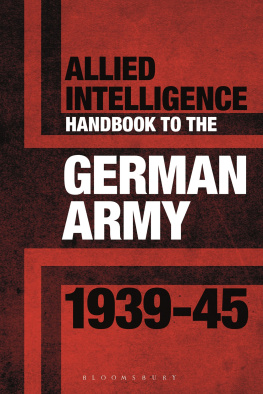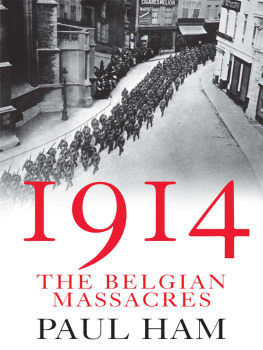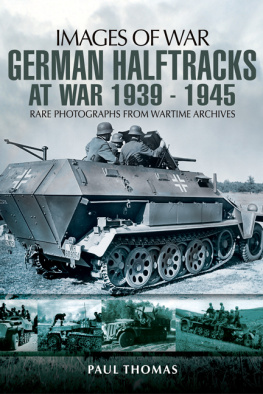This edition is published by PICKLE PARTNERS PUBLISHINGwww.pp-publishing.com
To join our mailing list for new titles or for issues with our bookspicklepublishing@gmail.com
Or on Facebook
Text originally published in 1954 under the same title.
Pickle Partners Publishing 2016, all rights reserved. No part of this publication may be reproduced, stored in a retrieval system or transmitted by any means, electrical, mechanical or otherwise without the written permission of the copyright holder.
Publishers Note
Although in most cases we have retained the Authors original spelling and grammar to authentically reproduce the work of the Author and the original intent of such material, some additional notes and clarifications have been added for the modern readers benefit.
We have also made every effort to include all maps and illustrations of the original edition the limitations of formatting do not allow of including larger maps, we will upload as many of these maps as possible.
GERMAN MILITARY INTELLIGENCE
BY
PAUL LEVERKUEHN
Translated from the German by
R. H. Stevens and Constantine FitzGibbon
LIST OF ILLUSTRATIONS
The Big Three of the Abwehr: Canaris with his two chief subordinates, Lahousen and Piekenbrock, in Russia, 1942.
1. German and Japanese intelligence officers at an inspection of Caucasian volunteers on the Russian front, 1942.
2. German and Japanese intelligence chiefs in conference with Subhas Chandra Bose.
3. Canaris travelling incognito in Spain, January 1943.
4. Greetings cards from Raschid Ali el Gailani and the Mufti of Jerusalem.
Invitation card sent by Fauzi el Kaukji to Lahousen. 40
5. A party given by Fauzi el Kaukji, the Arab leader, on 11 th December 1941 in honour of the Mufti of Jerusalem.
1 A GERMAN INTELLIGENCE OFFICER IN ISTANBUL
THE German Military Nachrichtendienst corresponds broadly to what, in the English-speaking world, is understood by Intelligence Service; while the term Abwehr (literally Defence) was originally applied to that particular branch of the Nachrichtendienst which had the task of combating the activities of foreign intelligence services; in other words, it meant the German Counter-Espionage Section.
When the hundred thousand-strong army permitted to Germany under the Versailles Treaty was formed on January 21 st , 1921, an Abwehr Section was set up in the German Ministry of Defence in Berlin. This Abwehr Section was under the command of Colonel Gempp, who had worked in the German Intelligence Service during the first war under Colonel Nicolai. The Section was a small one and consisted of two or three General Staff Officers with a round half-dozen officers and a small clerical establishment attached; it was divided into two Sub-SectionsEast and Westbut originally it possessed no technical facilities for such things as wireless, the preparation of passports, personal documents and the like, which are essential to the efficient working of a service of this nature. For out-station work it had at its disposal the Abwehr stations which had been set up in each of the seven military commands and which initially consisted of one General Staff Officer, one officer assistant and such clerical staff as was required. It was gradually expanded to include offensive as well as defensive intelligence work, both within Germany and abroad, but from that time the term Abwehr has remained in accepted use.
Individual undertakings of the Abwehr Service have been the subject of innumerable stories in the press. They are based partly on information given by those who took part in them. But this information has often been supplemented and embellished with fictitious dialogue and other ornaments until it is hard to see where truth ends and fiction begins. On the other hand, to those who urge that a proper history of the Abwehr Service ought to be written, the usual reply has so far been that the files of the Abwehr have been taken to Washington by the Americans and are therefore no longer available. But the importance of these files must not be exaggerated, any more than that of the Canaris Diaries, about which so much has recently been published. Much of the Abwehrs most significant activity finds no place in the official files.
In the out-stations we burnt, with a certain measure of satisfaction, everything that had been committed to paper, and quite apart from the obligation to do so, we were only too glad to be rid of it. The contents of the captured files are only the dead bones of the story; the living spirit survives in the memories of those who served, and when they are dead, then the history of the Abwehr can no longer be written.
To set down some of the stories of the men who served in the Abwehr is the thought which gave impetus to the writing of this book. I have, of course, asked myself whether I can accept the responsibility for its publication, and I feel justified in giving myself an affirmative answer. In the first place, as Chief of the Istanbul Station and also of the branch of the intelligence service called the Near East War Organization (194144), I acquired practical experience of Abwehr activity; I knew Admiral Canaris, for many years head of the Abwehr, personally and had ample opportunity to observe both the work of Abwehr Headquarters and his direction of it. On the other hand, as a reserve officer, I was sufficiently detached from its activities to maintain an objective attitude. Furthermore, as defending counsel for the Supreme Headquarters Staff at Nuremberg and for Field-Marshal von Manstein at Hamburg, I later had to grapple with the problems that confronted the High Command and thus obtained an insight into the actions of German military leaders which was essential to a proper evaluation of the place of the Abwehr Service within the whole of Germanys war organization.
It has not been possible, nor was it ever my intention, to write a complete history, to deal with every phase of the war in every land in which the Abwehr operated. Such a work would be altogether too comprehensive, and far too exhausting for the general reader. Rather I have tried to select the most important or typical episodes. What is here described is based on absolutely authentic information. That I have not been able to do full justice to the accomplishments of all my brother officers is a fact which I must record with regret.
I have, in most cases, omitted or changed the names of those men who kindly helped me in the production of this book, due primarily to the fact that every member of any intelligence service has a not unnatural aversion to finding his name in print, for all the world to see. Not a few of the members of the Abwehr, too, have had bitter experiences in the post-war period, and therefore prefer to remain anonymous. I have fully respected both the wishes of the former and my obligations towards the latter; but to all who gave me their invaluable support I wish to express my heartfelt thanks.
At the outbreak of war in 1939, the Near and Middle East were of no direct interest to the German High Command, and it was not for a moment considered likely that German troops would be called upon to operate in these parts of the world. They were, however, of indirect interest, because of the pact with Soviet Russia. Germany had been compelled to come to an agreement with the Russians on the division of Poland and to cede to them both Finland and the Baltic States as spheres of influence. This was, admittedly, regrettable, but it did not threaten to have any warlike repercussions which would affect Germany directly; and from the point of view of German war industry and economy, these countries were of no importance. There was but one spot which aroused apprehensionRumania. A war in the Balkans would make things very uncomfortable, and if the Rumanian oilfields were lost or came under Russian control, then Germany would be entirely dependent for her natural oil supplies on Russia. It was known that the Russians intended to occupy and annex Bessarabia. In an attempt to distract them from this it was considered whether it would not be possible to persuade them to turn their activities to the Near or Middle Eastor perhaps even further eastwards. An onslaught on Afghanistan and a threat to the North-West frontier of India would, from the German point of view, have been an excellent thing, for it would have tied down very large British forces which otherwise could be sent to a European theatre of war. This Afghan idea, however, was quickly abandoned as I shall show in a later chapter.














